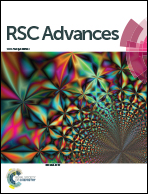Continuous oil–water separation with surface modified sponge for cleanup of oil spills†
Abstract
A continuous in situ oil–water separation technique for cleanup of oil spills has been designed using surface modified polyurethane (PU) sponges as sorbents. By connecting PU sponges to a vacuum pump, they can continuously separate various kinds of oil and organic pollutant, including engine oil, diesel oil, peanut oil, liquid paraffin and hexane, from the surface of water with negligible water take-up. The sorbents used in the technique were prepared by dip-coating commercial PU sponges with TiO2 sol and n-octadecylthiol successively. After surface modification, the sponges change from hydrophilic to superhydrophobic and superoleophilic surface with the water contact angle measured to be 152°. The as-prepared sponges absorb a broad variety of oils and organic solvents with high oil absorption capacity (80–110 g g−1) and negligible water take-up at both static and dynamic conditions. The success of the continuous in situ oil–water separation technique is based on the excellent oil–water selectivity and oil adsorption capacity of the modified sponges.


 Please wait while we load your content...
Please wait while we load your content...